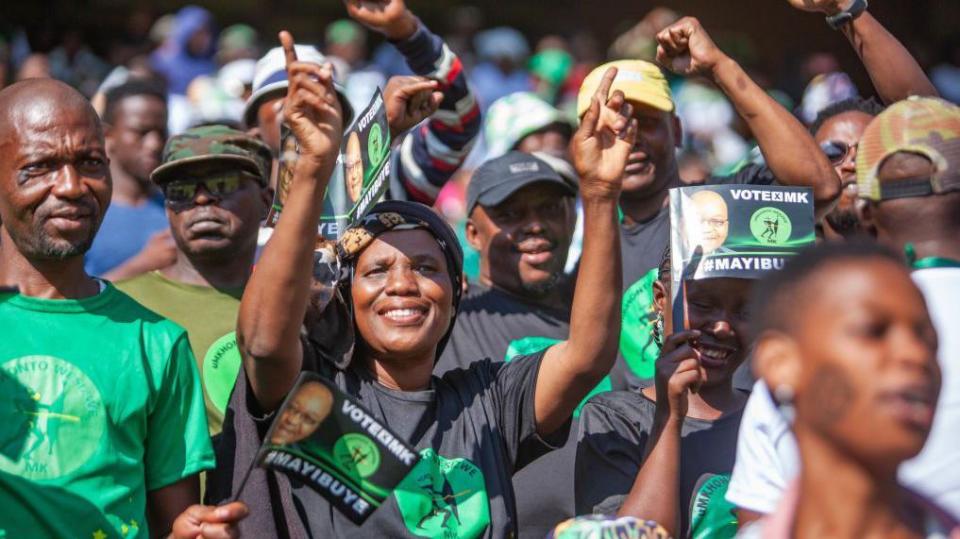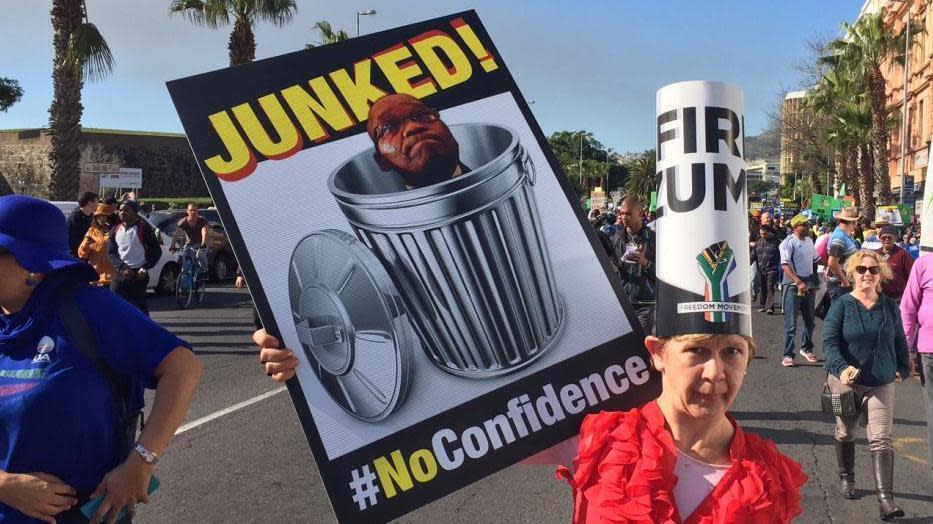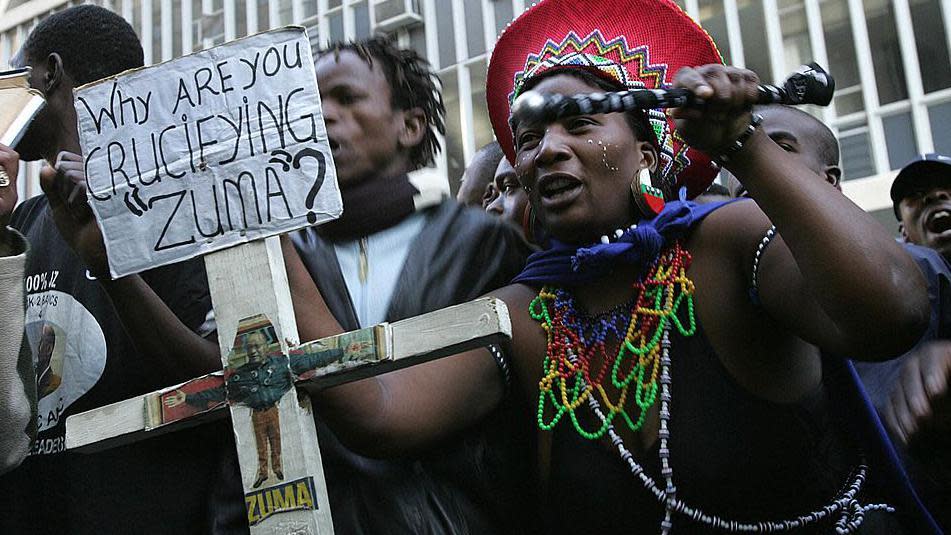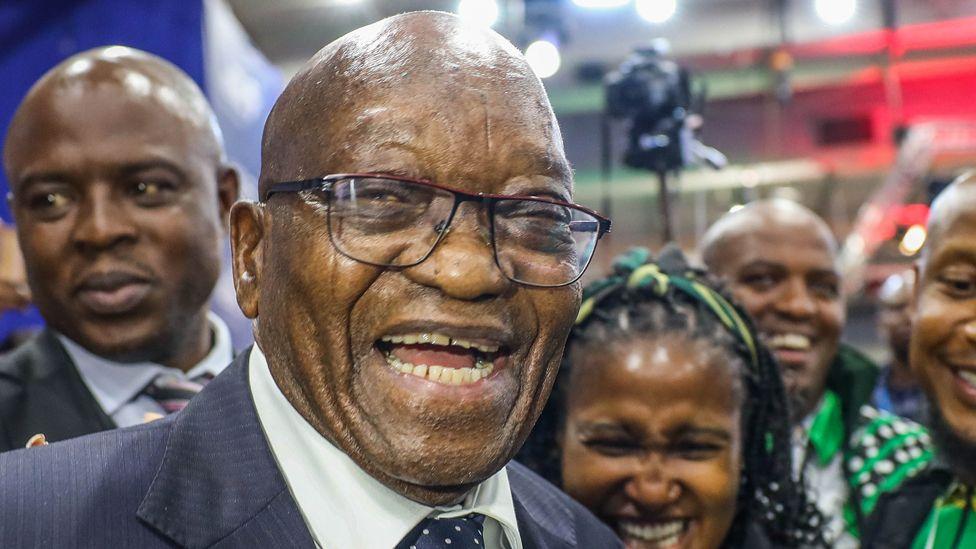Elected, accused of corruption – dismissed, accused of rape – acquitted, elected president, accused of corruption again – denied again, impeached, imprisoned for contempt of court – released, expelled from parliament.
For most politicians, almost any of these blows would have been fatal to their careers, but not for South Africa’s Jacob Zuma.
As a determined prize fighter, the 82-year-old former president may have been knocked down occasionally, but he has never been knocked out.
He did his usual dance during the recent election campaign and the results of last week’s elections show that he still has a major influence.
He heads a new party that took on the African National Congress (ANC) and won 15% of the vote.
The results have been humiliating for the ANC, the liberation movement that Zuma once led, as it has lost its outright parliamentary majority for the first time in three decades – and the “Zuma tsunami”, as it has been dubbed, is partly responsible.
In the center of the coastal city of Durban, the main city in KwaZulu-Natal province, Mr Zuma’s smiling face beams down from virtually every street lamp on green-and-black election posters of his recently formed party, uMkhonto weSizwe (MK) or Speer of the nation.
There is no doubting the octogenarian’s exalted status here in his home country, where he is respected for upholding his cultural and traditional Zulu beliefs.
He is also praised for his role as a peace mediator during the political violence of the early 1990s that nearly derailed the country’s transition to democracy.
And more than two decades ago, he was credited with switching voters in KwaZulu-Natal from the Zulu nationalist Inkatha Freedom Party to the ANC.


This year he was able to take his loyal supporters to MK, which is named after the former armed wing of the ANC and has great political symbolism because of its role in the struggle for the end of white minority rule.
The launch of MK’s manifesto, a week before the May 29 elections in a packed 40,000-seat stadium, was a clear signal that “uBaba” (father), as Mr Zuma is known, was back.
Braving the scorching heat, the sea of his supporters chanted: “Zuma! Zuma!”
One shouted: “Uyinsizwa nxamala,” which roughly translates from Zulu as “a fearless warrior who never backs down.”
When the MK party leader arrived at his polling station, a modestly built primary school without toilets, on election day, he was greeted by hundreds of people shouting his clan names: “Msholozi, Nxamalala, Maphum’ephethe”.
The former president waved and smiled at them before entering a classroom to vote.
As he left the polling station, his supporters sang a pro-Zuma song in Zulu that was made popular several years ago when the former president was accused of corruption.
One chorus they broadcast translates as: “What has Zuma done? You are influenced by propaganda from so-called white monopoly capital.”
Many politicians can count on a loyal core of sympathizers, but Mr Zuma’s ability to genuinely connect with the poor and marginalized is what sets him apart.
And this could explain its continued popularity, despite numerous scandals and damning accusations.
Six years ago, it seemed his luck had finally run out when he was forced out of the presidency after a litany of corruption allegations, which he denied.
Cyril Ramaphosa replaced him as president and Zuma became a political pariah and a damaged brand.


Things got worse three years ago: he was sent to prison after being found in contempt of court for failing to testify during his nine-year term as president and for failing to give evidence in a judicial inquiry into corruption.
His arrest in July 2021 sparked the deadliest riots since the end of white minority rule in 1994 and led to the deaths of more than 300 people.
He was sentenced to 15 months, but President Ramaphosa released him after serving just three in an attempt to calm him and his angry supporters.
Just a few weeks ago, Zuma appeared to be in for another blow after being legally barred from membership of parliament following his conviction.
But none of that seemed to matter to voters, and his tendency to outmaneuver his political opponents was clear, which the ANC recognized.
“Jacob Zuma is a force to be reckoned with in South African politics… we have never underestimated him,” ANC secretary-general Fikile Mbalula admitted as he reflected on his party’s dismal performance.
Despite his suspension from the ANC, Zuma remains a member of the party that ended apartheid.
With no formal education and a modest upbringing, his anti-apartheid activism eventually saw him sentenced to ten years in the infamous Robben Island prison, together with Nelson Mandela.
After the ban on the ANC was lifted by the white government in 1990, Zuma returned from exile and rose through the ranks of the party. In 1999 he was appointed vice president of the country.
He was subsequently implicated in corruption charges in 2005, which he denied, relating to a 1999 arms deal, and was sacked by then-president Thabo Mbeki. This case is dragging on – and he is still being sued over the multi-billion dollar scandal.
In December of that year he was accused of raping the daughter of a party member. He admitted to having sex with the woman, who was HIV positive, but said the encounter was consensual.
Mr Zuma sparked ridicule when he said he had showered after sex to prevent HIV transmission and that a healthy man was unlikely to get HIV from a woman.
The following year he was acquitted of rape.


He then fought his way back to the top of the ANC and became president in 2009.
Zuma remained in this position until he was forced to resign in 2018 after intense pressure from his own party.
This came after he was accused of being involved in a process known as ‘state capture’, in which he allowed a family of wealthy businessmen – the Guptas – to wield enormous political influence.
Zuma and the Gupta brothers have dismissed the corruption allegations as a fabrication.
The former president and his supporters blame his successor, Mr Ramaphosa, for his downfall.
And now he may want to settle a score with his rival.
With coalition talks underway, the MK party has made it clear that it will only form a partnership with the ANC if the president resigns.
Once again encouraged by his party’s performance, Zuma struck the first blow on Saturday, alleging irregularities.
“Nobody should announce the results, don’t provoke us, don’t cause trouble,” he said on the eve of the announcement of the final election results.
The Election Commission has strongly denied these allegations.
Police are now on alert due to the risk of possible unrest following Mr Zuma’s comments.
But despite this acrimonious situation and relationship, the ANC has not ruled out a coalition with the MK party.
“We are talking to anyone who is willing to form a government with us,” Mbalula said.
It all shows Mr Zuma’s remarkable ability to stay in the ring.




Go to BBCAfrica.com for more news from the African continent.
follow us on twitter @BBCAfricaon Facebook at BBC Africa or on Instagram at BBCAfrica
BBC Africa Podcasts







